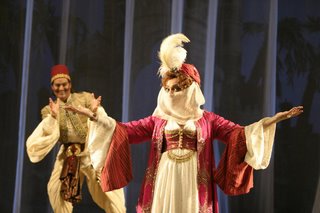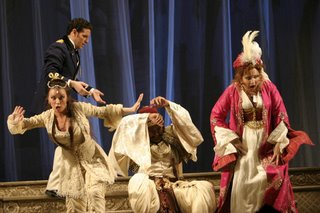Let's Do Silly Things in Algeria
 What makes opera so fascinating is its infinite variety of substance and its many different ways to appeal (or appall – depending on one's predilections). Heavy and meaningful, lean, sophisticated ambrosia, silly entertainment; anything is possible and all can delight as long the particular elements are well done; as long as a works' depths are probed, or its limitations respected. The Washington National Opera served a helping of ‘silly entertainment’ – superbly done – with Donizetti’s L’Elisir d’amore and another one, in rapid succession, with Rossini’s L’Italiana in Algeri. The latter, too, did the company proud in a light-hearted, time-tested, 33 year-old MET production by Jean-Pierre Ponnelle that has been, at various stages of its reincarnation, well described as “harum-scarum” and “burlesque.”
What makes opera so fascinating is its infinite variety of substance and its many different ways to appeal (or appall – depending on one's predilections). Heavy and meaningful, lean, sophisticated ambrosia, silly entertainment; anything is possible and all can delight as long the particular elements are well done; as long as a works' depths are probed, or its limitations respected. The Washington National Opera served a helping of ‘silly entertainment’ – superbly done – with Donizetti’s L’Elisir d’amore and another one, in rapid succession, with Rossini’s L’Italiana in Algeri. The latter, too, did the company proud in a light-hearted, time-tested, 33 year-old MET production by Jean-Pierre Ponnelle that has been, at various stages of its reincarnation, well described as “harum-scarum” and “burlesque.”
The music of L’Italiana being the culinary equivalent of a meringue (just about the same nutritional value), it serves its purpose to delight in Rossini’s ever charming manner and the orchestra under Riccardo Frizza did its best to enliven the often repetitious, schematic music and went beyond the call of duty when the music made one of its quick excursions into truly inspired territory. Only some trumpets sounded taxed on a few occasions.
With singers like Juan Diego Flórez (one of the new generation of male operatic stars along with Villazon, Alagna, Cura, Calleja), Olga Borodina, Ildar Abdrazakov (Mme. Borodina’s husband), and the excellent Lyubov Petrova (whom we reviewed last year at La Maison Française), success on the vocal front was all but guaranteed. Surely, Borodina’s weighty, heavy mezzo-soprano is one or two numbers bigger than might be ideal for the role of Isabella (the Italian gal stranded in Algeria, loving Lindoro but forced to marry Mustafà), but while she took the coloratura with caution (not to say trepidation), she sang everything else with gusto and beautiful heft. Juan Diego Flórez (Lindoro) has a light, agile voice of great appeal. The appeal, undeniable as it is, does not extend quite as much to these ears; I find him all too often too nasal to truly enjoy; although that quality is never distinctively ugly, either. With his hammed-up, funny-man interpretation and radiant arias, he clearly was and will be the star of the show. (Still he looked an odd lover to Borodina's Isabella: Never marry a girl with a bigger voice, bigger thighs; not even in an opera. Especially if she can sing lower than you.) The actual center figure, however, is Mustafà, and burly-voiced Abdrazakov relished the role visibly and audibly. The banter with his real-life wife often provided for the funniest moments (and this opera is all about fun!), his resonant bass and often hilarious, over-the-top buffo acting provided one highlight after another. There are not really minor roles in this opera – only three tiers of major roles. Whether one considers Elvira, the shunted but devoted wife of Mustafà (he wants to rid himself of her in favor of Isabella), part of the four ‘major-major’ roles or, with Taddeo (sung by veteran Italian baritone Bruno de Simone), in the second group (overseer Haly – Valeriano Lanchas – and Elvira’s maid and confidante Zulma round out the field as the least featured, if still substantial roles) doesn’t matter. At least not when she makes such beguiling use of her stage time.
There are not really minor roles in this opera – only three tiers of major roles. Whether one considers Elvira, the shunted but devoted wife of Mustafà (he wants to rid himself of her in favor of Isabella), part of the four ‘major-major’ roles or, with Taddeo (sung by veteran Italian baritone Bruno de Simone), in the second group (overseer Haly – Valeriano Lanchas – and Elvira’s maid and confidante Zulma round out the field as the least featured, if still substantial roles) doesn’t matter. At least not when she makes such beguiling use of her stage time.
Tim Page, 'L'Italiana in Algeri': Tour De Force (Washington Post, May 15) Kelly Jane Torrance, 'L'Italiana' regales house (Washington Times, May 15) Charles T. Downey, DCist Goes to the Opera (DCist, May 17) Tim Smith, An opera that's a laugh riot (Baltimore Sun, May 18) |
After intermission, the opera’s length becomes more notable; a cut here or there would surely not be sacrilege? Neither the music nor the ever repeated back-and-forth of text always merits the length of a particular scene. And ultimately, there is only so much “Pappataci-ing” that one can take (“Così un vero Pappataci / Tu sarai da capo a piè, / Così un vero Pappataci / Resterai da capo a piè”). But for all that, this opera is not only certain to delight most regular opera-goers but might well be a near ideal entertainment for young newcomers to the genre. Anyone who can appreciate the Marx brothers will have a blast, the quality of the singing is superb, the music is extremely listener-friendly. May 18th, 21st, 24th, 26th, 30th, and June 3rd are the remaining performances, during which you can convince yourself of L’Italiana’s qualities.




















































